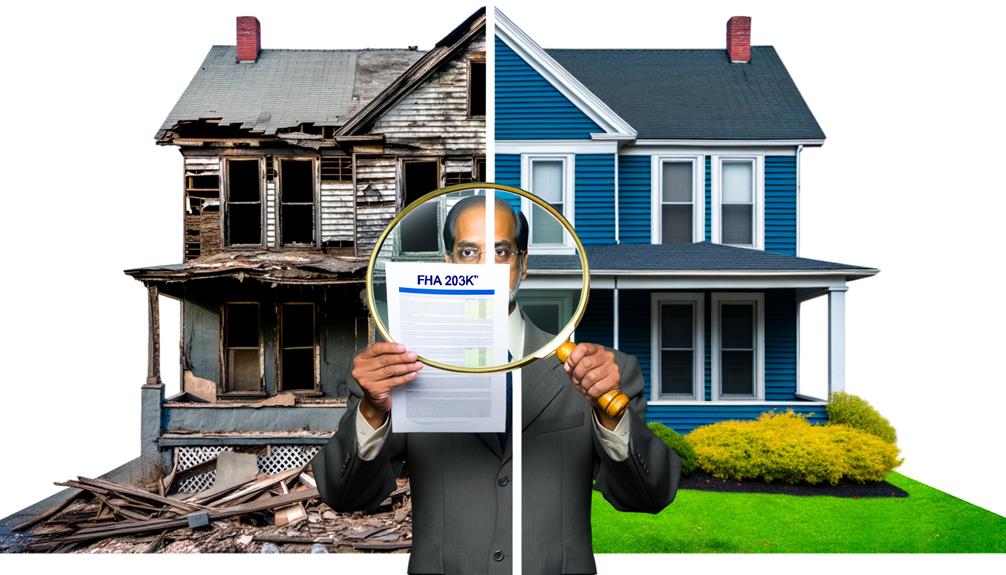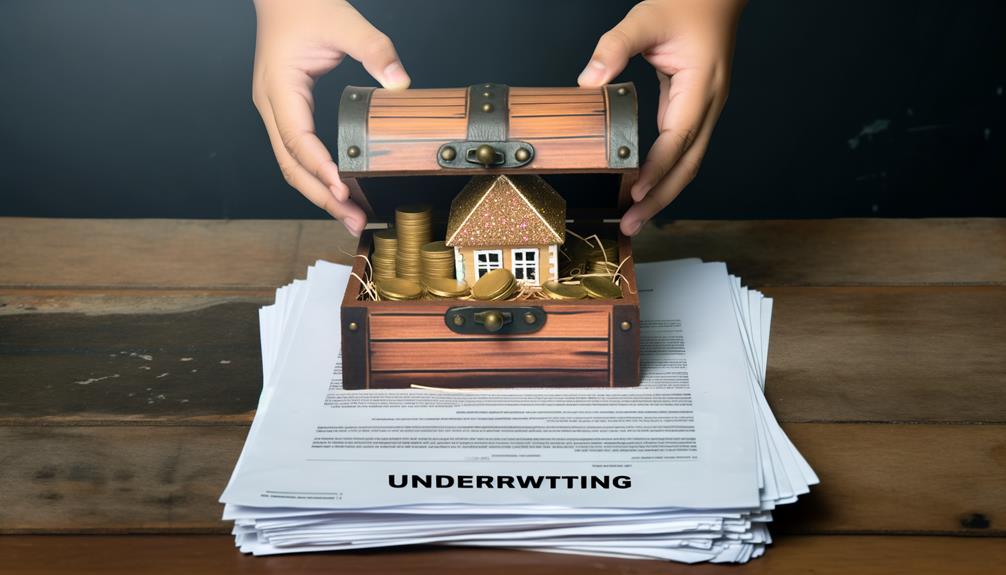In the world of real estate, one occasionally encounters the term 'cash only house', a phrase that can baffle even seasoned investors. This term refers to properties that, for various reasons, may not qualify for conventional financing methods, hence necessitating an all-cash transaction.
However, the complexity of this scenario shouldn't dissuade potential investors or homebuyers, as there exist several viable means to finance such purchases. This discussion will explore these methods, weighing their pros and cons and examining their applicability to different buyer circumstances.
There's more to unravel about cash-only homes than initially meets the eye, and deciphering these intricacies can be a rewarding endeavor.
Key Takeaways
- Cash-only houses require alternative financing methods such as certified checks, wire transfers, hard money loans, or FHA 203(k) rehab loans.
- Hard money loans fill a niche for situations where conventional financing is unfeasible, focusing on the property's value rather than the buyer's credit score.
- FHA 203(k) rehab loans are government-backed loans for major renovations or cosmetic upgrades, providing a level of security to borrowers.
- Strategies for financing cash-only homes include upfront underwriting, cash-offer companies, mortgage pre-approval, and utilizing the FHA 203(k) rehab loan for buying and renovating the property.
Understanding Cash Only Houses
While it may seem unconventional, understanding the concept of cash-only houses is crucial for prospective buyers. These properties often require alternative methods of financing such as certified checks, wire transfers, hard money loans from private investors, or government-backed FHA 203(k) rehab loans for significant remodeling.
These options offer an alternative route to purchase a cash-only property, bypassing the need for traditional mortgage financing. When you buy a cash-only home, you expedite the sales process, circumventing mortgage qualifications and paperwork. This non-traditional route to homeownership not only promises a quicker transaction but also holds significant investment potential.
Paying with certified checks or wire transfers eliminates fees and interest, the absence of which is a considerable advantage of this method. Hard money loans, typically short-term and high-interest, are another financing option for a cash-only house. These loans focus on the property's value rather than your credit score, making them suitable for buyers with poor credit history.
Lastly, FHA 203(k) rehab loans provide funding for significant home remodeling, although they require extra documentation and an extended closing process. Understanding cash-only houses can open up alternative avenues to homeownership.
Exploring Hard Money Loans
Delving into the realm of hard money loans offers a unique perspective on financing options, particularly for potential buyers interested in cash-only properties. As an alternative choice, hard money lenders provide short-term, high-interest loans. Instead of focusing on the borrower's credit, they base their lending decisions predominantly on the property's value.
When exploring hard money loans, it's crucial to be aware of certain aspects:
- Hard money loans (HML) are distinctly different from traditional mortgage loans, filling a niche for situations where conventional financing is unfeasible.
- Down payment is a requirement, typically starting from 20%, with the remaining funds coming from the loan.
- One of the appealing aspects of HMLs is their speedy closing process, often completed within a week.
- Before considering this option, evaluate the property's condition and have a renovation plan in place.
- Remember that these loans come from private investors, hence the high-interest rates.
Decoding FHA 203(k) Rehab Loans

Moving forward, we shift our focus to FHA 203(k) Rehab Loans, a distinct financing option for those wishing to make substantial renovations on a property. This government-backed loan offers both a standard and limited program, catering to major renovations or cosmetic upgrades respectively.
However, due to this type of loan's emphasis on property rehabilitation, additional documentation and a longer closing process are to be expected when compared to traditional bank loans.
Understanding FHA 203(k) Loans
The FHA 203(k) Rehab Loans, government-backed financial instruments, are specifically designed for major remodeling or repair projects, providing a viable solution for financing properties that traditional mortgages may not cover, including a cash only house. Understanding FHA 203(k) loans are key to leveraging these tools effectively.
- They offer two program options: standard 203(k) for major renovations and limited 203(k) for cosmetic upgrades.
- The loans are a fit for cash-only situations, making them an appealing loan to buy properties that conventional mortgage lenders might bypass.
- They require additional documentation, lengthening the closing process compared to traditional bank loans.
- They are beneficial for new homebuyers and existing homeowners investing in distressed properties or making significant renovations.
- The loans are government-backed, providing a level of security to borrowers.
Eligibility for Rehab Loans
Navigating the eligibility requirements for the FHA 203(k) rehab loans can be complex, yet is crucial for those seeking to finance major remodeling or repair projects for properties, including those in cash-only situations.
Both new homebuyers and existing homeowners can avail of these loans, which are designed to turn cash-only homes into financed properties.
Eligibility for rehab loans is based on the property's estimated value after repairs, making it an attractive option for private investors looking to avoid high-interest loans.
However, applicants should be prepared for extra documentation and a longer closing process.
Despite these challenges, understanding the FHA 203(k) rehab loans can open avenues for financing, ultimately welcoming individuals into the realm of property ownership.
Benefits of FHA 203(k)
Understanding the benefits of FHA 203(k) rehab loans is essential, particularly as these government-backed loans offer significant financing for major property improvements, serving as a lifeline for both new homebuyers and existing homeowners. Whether you're looking to buy a house or refinance your current mortgage loan, FHA 203(k) plays a pivotal role in the real estate market.
- FHA 203(k) provides an avenue for major remodeling or repairs, offering a comprehensive solution for property enhancement.
- It caters to both new and existing homeowners, broadening the scope of potential beneficiaries.
- The program is divided into Standard and Limited 203(k) for major renovations and cosmetic upgrades, respectively.
- It involves thorough documentation and a detailed closing process, ensuring proper planning.
- Lastly, it serves as a structured solution to finance property improvements, especially for cash-only purchases.
Pros of Cash Only Homes

Numerous advantages accrue to those who opt for cash-only homes, featuring a swift and uncomplicated transaction process that effectively eschews the need for financing or mortgage applications. The pros of cash only homes extend beyond the speed and simplicity of the buying process.
A significant advantage of buying a cash-only house is the potential for a faster sales process, usually within a week or two. This rapid turnaround benefits both buyers and sellers, ensuring a smooth transition and minimizing any potential delays or complications.
Another compelling pro of cash-only homes is the investment potential they offer. With lower upfront costs and no fees or interest associated with cash transactions, buyers can enjoy more significant returns on their investments.
Moreover, the phrase cash-only carries a particular appeal for those looking at how to get financing for a cash only house. It enables buyers to invest in property without having the full capital upfront, thus providing flexibility in their investment strategy.
In essence, cash-only homes provide a streamlined, risk-free process for both buyers and sellers, making them an attractive option for all parties involved in the property market.
Cons of Cash Only Homes
In purchasing a cash-only home, buyers may face significant financial risks and limited purchase options. The need for a sizable cash outlay can create a barrier for many, potentially extending the time it takes to sell the property.
Moreover, the absence of financing can reduce the buyer's ability to negotiate favorable terms and miss out on the benefits of mortgage interest tax deductions.
Potential Financial Risks
While the allure of purchasing a cash-only house may seem enticing, it is essential to navigate the labyrinth of potential financial risks associated with such a transaction. Before you rush to buy the house, consider the following:
- Securing a cash offer may lead to higher interest rates and fees.
- You may face challenges in securing a large loan amount from a mortgage broker due to the higher risk associated with cash-only properties.
There's a potential risk of losing the property to foreclosure if you're unable to keep up with loan repayments. Banks and lenders may hesitate to provide loans for cash-only houses.
The potential financial risks and costs demand careful consideration before opting for a loan to purchase a cash-only house.
Limited Purchase Options
Beyond the potential financial risks, purchasing a cash-only house also presents limited purchase options, largely due to the constraints in financing such a transaction. Traditional mortgage loans are not feasible, restricting the buyer's financing preferences. Hard money loans from private investors or companies are often the primary alternative to secure financing for these properties.
| Financing Option | Feasibility for Cash-Only Homes |
|---|---|
| Traditional Mortgage Loan | Not Feasible |
| Hard Money Loans | Feasible |
| FHA 203(k) Rehab Loan | Feasible, but requires extra documentation |
Buyers should carefully weigh these cons, which include higher interest rates, potential difficulty in securing the loan, and the risk of foreclosure. A cash-only property can be appealing, but understanding the limited purchase options is key.
Journey to Homeownership

Embarking on the journey to homeownership, prospective buyers must consider various financing options, including certified checks, wire transfers, hard money loans, and FHA 203(k) rehab loans, particularly when seeking to purchase a cash-only house. These options provide alternatives to traditional mortgage applications, offering flexibility in the ever-changing housing market.
- Certified checks and wire transfers offer a straightforward and secure means of transferring funds directly, eliminating the need for a mortgage.
- Hard money loans, backed by private investors, provide short-term, high-interest loans based on the property's value, ideal for cash-only situations.
- FHA 203(k) rehab loans, supported by the government, allow for substantial renovations or cosmetic upgrades, catering to new homebuyers and existing homeowners alike.
- In a seller's market, strategies such as securing pre-approval, partnering with a reliable real estate agent, and utilizing professional expertise can be invaluable when looking to purchase.
Navigating the journey to homeownership requires careful planning and consideration. By exploring the available financial options and strategies, prospective buyers can successfully secure their dream home, even in a cash-only scenario.
Making Cash Offers Without Cash
Navigating the financial avenues of buying a cash-only house, prospective homeowners may find that upfront underwriting and cash-offer companies present unique opportunities to make cash offers without possessing the cash immediately. These entities provide the ability to purchase homes traditionally designated as 'cash only', by ensuring the buyer's offer is backed by the company's resources.
For instance, a buyer might get a mortgage pre-approval from their bank, which signifies that the bank is willing to lend a certain amount. The pre-approval can then be shown to the cash-offer company, which might agree to front the cash for the home purchase, effectively turning the buyer's offer into a cash offer.
The FHA 203(k) rehab loan is another viable option for buyers looking to purchase a fixer-upper. This loan program combines the purchase price and the cost of renovations into one mortgage, making it an attractive option for those wanting to buy and renovate a cash-only property.
Whatever the chosen method, buyers should make sure to carefully consider the terms and conditions of their agreement, to ensure a smooth and successful home purchase. Each option has its own advantages and drawbacks, and it's important for prospective homeowners to thoroughly understand their chosen path to homeownership.
Unpacking Upfront Underwriting

In the landscape of home buying, upfront underwriting emerges as a powerful tool that enables prospective homeowners to make attractive cash offers, even without immediate access to the necessary funds. This process allows buyers to navigate a competitive sellers' market, making their offers more appealing to those selling a house.
However, this strategy requires some effort and due diligence from the buyer. Here are some key points to remember:
- Not all lenders offer upfront underwriting. Buyers need to shop around to find a lender that provides this service.
- Upfront underwriting involves going through the complete mortgage application and approval process before making an offer. This can be more time-consuming than securing a traditional mortgage.
- Several cash-offer companies, such as Ribbon Home, Homeward, and Accept.inc, offer upfront underwriting services. Partnering with these companies can simplify the process.
- Buyers must be prepared to move quickly once their offer is accepted. The underwriting process must be completed before the transaction can close.
- Cash offers can be more appealing to sellers, giving buyers an edge in a competitive market.
Buying in a Sellers Market
With the recent surge in the housing market, prospective buyers find themselves in a highly competitive sellers' market, necessitating strategic approaches to secure their dream homes. Buying in a sellers market can be quite challenging, as sellers often have the upper hand due to high demand and limited supply.
To navigate the current market, potential buyers must be fast, decisive, and ready to negotiate. Start by understanding the market value of the houses in your preferred location. This will equip you with the necessary knowledge to make a competitive yet reasonable offer. Sellers are more likely to consider buyers who demonstrate their seriousness about a property, and a comprehensive understanding of the market value can display this commitment.
Additionally, consider securing pre-approval for financing. This not only provides a clear indication of your budget, but also signals to sellers that you are a serious contender. In a sellers' market, this could set you apart from other prospective buyers who may not have their financing in order.
Selling With Cash House Buyers

While securing pre-approved financing can certainly be advantageous in a sellers' market, another viable strategy worth considering involves dealing with cash house buyers. This particular strategy is often favored by sellers who wish to quickly sell their property without the hassle of long closing periods or potential financing issues.
Selling with cash house buyers comes with several benefits:
- Immediate payment: Cash buyers often pay immediately, eliminating the wait for bank financing.
- Quick closings: Cash transactions can close faster, as there is no need for lender approval.
- Fewer contingencies: Cash sales often have fewer contingencies, which can make the selling process smoother.
- As-is sales: Cash buyers often buy homes as-is, potentially saving sellers significant repair costs.
- No financing fall-through: With cash sales, sellers don't have to worry about the deal falling through due to financing issues.
Selling with cash buyers is not only a reliable strategy but also a straightforward one that simplifies the home selling process. The comfort of knowing that the deal is less likely to fall through can provide a sense of relief and belonging to both buyers and sellers in the transaction.
Frequently Asked Questions
Can I Use a Personal Loan to Buy a House Outright?
Yes, a personal loan can be used to buy a house outright, though loan eligibility, interest rates, repayment plans, and the impact on your credit score should be carefully evaluated before proceeding.
How Do I Get Around Cash Buyers Only?
Navigating around cash-only buyers may seem daunting. Consider cash alternatives like bridge loans, exploring mortgage possibilities, or negotiating seller financing. These strategies can provide an edge in this competitive real estate landscape.
Can You Buy a House With 100% Cash?
Yes, you can buy a house with 100% cash. This approach offers numerous cash advantages, like expedited property negotiations and a simplified buying process, making your offer more attractive to sellers in competitive markets.
How Much Less Should You Offer on a House When Paying Cash?
When buying a house with cash, it's reasonable to offer 5-10% less due to the certainty and speed of cash transactions. However, the actual discount depends on negotiation strategies and the seller's circumstances.
Conclusion
In conclusion, navigating the purchase of a cash-only house can be likened to exploring an uncharted territory. It requires a robust understanding of non-traditional financing options like hard money loans and FHA 203(k) rehab loans.
While the terrain of cash-only homes can be challenging, armed with knowledge and strategic planning, potential homeowners can surmount these obstacles, paving a clear path towards a successful real estate investment.


